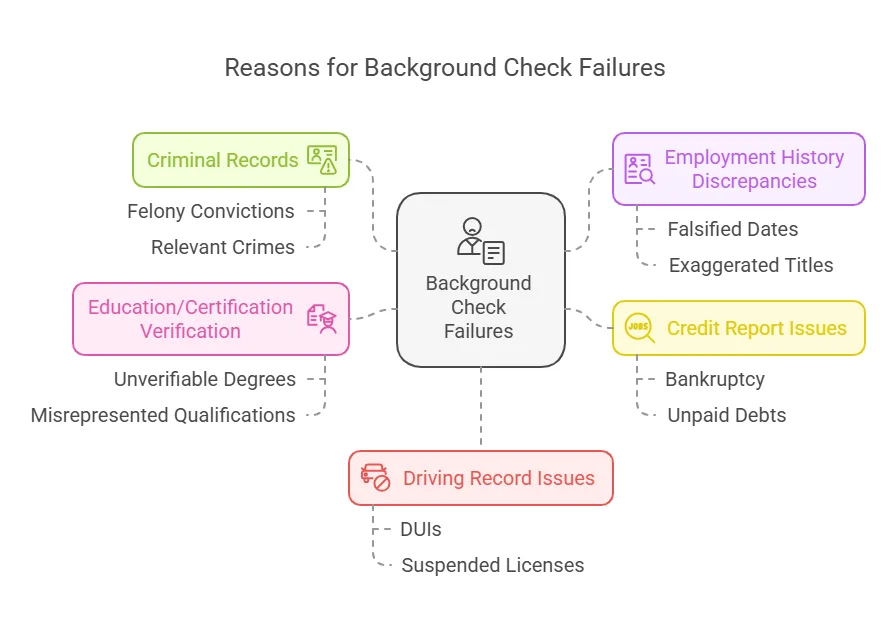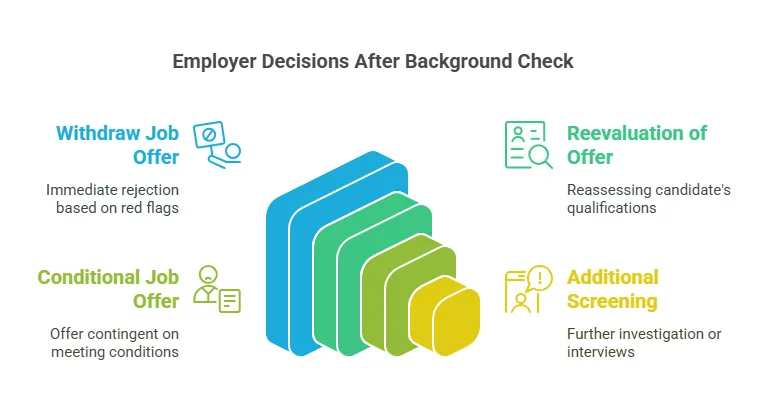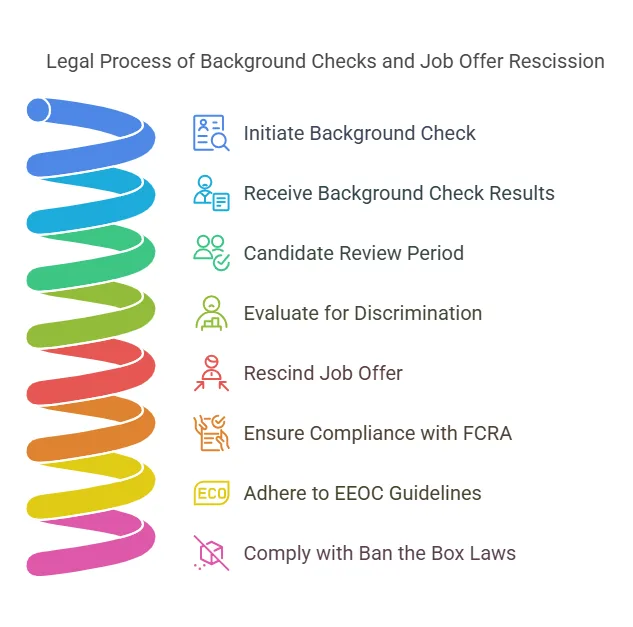Navigating the Aftermath of a Failed Background Check

What Does It Mean to Have a Failed Background Check After a Job Offer?
A failed background check after a job offer refers to a situation where an employer conducts a background check on a candidate who has already been offered a position, and the results raise issues that may affect the candidate’s eligibility for employment. In this context, the background check reveals negative information that may influence the employer’s decision to move forward with the job offer. These checks typically include a range of verifications, such as criminal history, employment history, education, credit reports, and other personal data.
While receiving a job offer is a positive step in the hiring process, a failed background check can result in the revocation or postponement of the offer, depending on the findings. The information revealed through a background check can sometimes create uncertainty or doubt for the employer, leading to a reassessment of the candidate’s qualifications or trustworthiness.
Common Reasons Why Background Checks May Fail

Background checks are comprehensive, and a variety of factors can contribute to a job offer being rescinded due to failed screening. Some common reasons why background checks may fail include:
- Criminal Records: A criminal history, particularly for serious offenses, is one of the most common reasons a background check may fail. Employers may reconsider an offer if a candidate has convictions for felonies or crimes relevant to the position, such as fraud for financial roles or violent crimes for jobs in healthcare or childcare.
- Discrepancies in Employment History: Employers often verify job history to ensure that candidates have the qualifications and experience they claim. Discrepancies, such as falsifying dates of employment, exaggerating job titles, or failing to disclose important employment information, can cause a background check to fail. Such discrepancies can undermine the trustworthiness of the candidate.
- Credit Report Issues: Some employers, especially in finance-related fields, may run credit checks as part of the hiring process. Poor credit history, such as a history of bankruptcy, late payments, or unpaid debts, can negatively impact a candidate’s job prospects, particularly if the job involves financial responsibilities or handling sensitive data.
- Unverifiable Education or Certifications: Employers typically verify educational qualifications and certifications claimed by a candidate. A background check may fail if the educational institution or certification body is unable to verify the credentials, or if the candidate misrepresents their educational background.
- Driving Record Issues: For positions that require driving, such as delivery or transportation jobs, a candidate’s driving record may be checked. Violations such as DUIs, suspended licenses, or a history of reckless driving can lead to a failed background check if they are deemed relevant to the job.
The Importance of Background Checks in the Hiring Process
Background checks play a crucial role in the hiring process, benefiting both employers and candidates. Here are several reasons why background checks are important:
- Ensuring a Safe and Trustworthy Work Environment: Employers need to know that the individuals they hire will contribute positively to the workplace and that they do not pose any security or safety risks. A background check helps identify potential risks, such as violent behavior or dishonesty, that could jeopardize workplace safety and integrity.
- Verifying Candidate Information: Background checks are an essential tool to confirm the accuracy of the information provided by candidates. They ensure that applicants’ claims regarding their education, employment history, and criminal record align with verified data, reducing the risk of hiring someone who has misrepresented themselves.
- Compliance with Industry Regulations: In certain industries, especially those involving sensitive data, financial information, or vulnerable populations (e.g., healthcare, finance, education), background checks are required by law to ensure that candidates meet regulatory requirements. For example, healthcare workers may be required to undergo background checks to prevent individuals with a history of abuse from being hired.
- Reducing Turnover and Liability: Employers invest time and resources into training and onboarding new employees. By performing background checks, employers can reduce the likelihood of hiring someone who may pose a risk to the company or its employees. This, in turn, lowers the risk of employee turnover and potential legal liabilities.
- Protecting Company Reputation: Hiring employees with undisclosed criminal records, falsified resumes, or questionable financial history can damage a company’s reputation. Background checks help businesses maintain their credibility by ensuring that only qualified and trustworthy individuals are hired.
Potential Outcomes if a Background Check Fails

If a background check raises red flags, the employer may take several actions, depending on the severity of the findings and the nature of the position offered. The potential outcomes can include:
- Withdrawal of the Job Offer: One of the most common outcomes of a failed background check is the withdrawal of the job offer. If a candidate’s criminal history, credit issues, or other discrepancies raise concerns, the employer may decide that they are not the right fit for the position, even if they were initially offered the job.
- Reevaluation of the Offer: In some cases, an employer may choose to reevaluate the candidate’s qualifications and the relevance of the negative information in the background check. For example, if the background check reveals a past criminal conviction for a non-violent crime but the candidate is otherwise highly qualified, the employer may choose to proceed with the offer or make a conditional offer based on additional screening.
- Conditional Job Offer: Employers may opt for a conditional job offer, where the candidate is hired contingent upon meeting certain conditions, such as completing additional background checks or obtaining a specific certification. This approach allows the employer to keep the offer open while addressing concerns raised during the background check.
- Additional Screening: If the background check uncovers some negative aspects but the employer is still interested in hiring the candidate, they may conduct additional screenings or interviews to gather more information. This process allows the employer to gain a clearer understanding of the situation before making a final decision.
How Employers Handle a Failed Background Check After a Job Offer
Once an employer receives the results of a background check, they must assess the findings and determine how to proceed. Here’s a typical step-by-step process employers follow when a background check fails:
- Review the Results: Employers carefully review the background check report, focusing on the discrepancies or issues that may have caused the failure. This could involve looking into criminal records, credit history, education verification, or employment history discrepancies.
- Notify the Candidate: Employers are required to notify the candidate if the background check has resulted in issues that might affect their employment. This notification must be provided in writing, often referred to as an adverse action notice. The notice will outline the specific information from the background check that led to the decision to reconsider the job offer.
- Allow Time for Disputing the Report: Under the Fair Credit Reporting Act (FCRA), candidates have the right to dispute any inaccuracies in the background check report. If a candidate believes that the information is incorrect, they can provide evidence or documentation to support their case. Employers must give candidates a reasonable amount of time to dispute the findings before taking any adverse action.
- Review and Decision: After the candidate has been notified and given the chance to dispute the results, the employer will review the dispute and make a final decision. If the dispute is resolved and the information is corrected, the job offer may be reinstated. However, if the issues are not resolved or remain valid, the employer may ultimately decide to withdraw the job offer.
How Employers Weigh Failed Background Checks
When a background check fails, employers must carefully evaluate the situation and decide whether the failure is significant enough to withdraw the job offer. Several factors are considered during this evaluation:
- The Severity of the Findings: Employers assess how serious the findings are in relation to the role. For example, a minor credit issue may be less concerning for a marketing position than for a financial advisor role. Similarly, a past conviction for a non-violent offense may not be as concerning for certain roles as a conviction for violent crimes, particularly when safety is a concern.
- Relevance to the Job: Employers consider whether the issues found in the background check are relevant to the position offered. For instance, an employer might overlook a past misdemeanor for a candidate applying for a non-customer-facing job but might rescind the offer for a position in a customer service role if the misdemeanor involved dishonesty.
- Time Passed Since the Offense: The timing of any criminal conviction or financial issue is an important factor in the employer’s decision-making process. A conviction from several decades ago may not be as impactful as a recent one. Employers may also consider the candidate’s rehabilitation or efforts to resolve past issues.
- Company Policies and Industry Regulations: Employers also follow internal policies and industry regulations when deciding how to handle failed background checks. For example, certain industries have strict requirements regarding criminal history (e.g., healthcare and finance), and employers in those sectors may be less flexible with background check results.
Alternatives to Rescinding the Job Offer
Instead of outright rescinding the job offer, employers may consider alternative options. These alternatives allow employers to make an informed decision while still offering a fair process for the candidate:
- Conditional Job Offers: Employers may opt to extend a conditional job offer, where the candidate is hired based on specific conditions, such as completing additional background checks, providing further documentation, or undergoing a probationary period. This approach allows employers to maintain flexibility while ensuring that the final hiring decision is based on complete information.
- Additional Screening or Interviews: If the initial background check raises concerns but the employer is still interested in the candidate, they may request additional screenings or conduct a follow-up interview. This allows the employer to address any concerns and clarify whether the issues are relevant to the job.
- Probationary Periods: In some cases, employers may choose to place candidates on a probationary period, especially if the background check revealed a minor issue. During this period, the candidate’s performance and behavior are closely monitored to assess whether they are a good fit for the role.
Precise Hire’s Background Check Services
At Precise Hire, we provide comprehensive and reliable background check services to help employers make informed hiring decisions. Our platform offers transparent and fair background screening solutions, ensuring that all information is verified accurately and promptly. We help employers navigate the complexities of background checks and provide a streamlined process for both employers and candidates. With Precise Hire, you can trust that your background check process will be efficient, compliant, and fair.
Legal Implications of Failed Background Checks After a Job Offer

Employers must adhere to specific legal requirements when using background checks in the hiring process. Several laws govern the use of background check results, particularly when a job offer is rescinded based on the findings:
- Fair Credit Reporting Act (FCRA): Under the FCRA, employers must follow a specific process when using a third-party background check service. This includes providing candidates with an opportunity to review and dispute any negative information found in the report before taking adverse action, such as rescinding a job offer.
- EEOC Guidelines: The Equal Employment Opportunity Commission (EEOC) provides guidelines to prevent discrimination based on criminal history. Employers must ensure that their decision to withdraw a job offer due to a failed background check does not disproportionately impact certain groups or violate anti-discrimination laws.
- Ban the Box Laws: Ban the Box laws prohibit employers from asking about criminal history on job applications. These laws are designed to give candidates with criminal records a fair chance in the hiring process. Employers must follow these laws to avoid violating candidates’ rights.
Frequently Asked Questions (FAQs)
Can an employer withdraw a job offer after a failed background check?
Yes, an employer can rescind a job offer if the background check reveals issues that impact the candidate’s eligibility for the position. However, the employer must comply with legal requirements, including notifying the candidate and allowing them time to dispute any errors.
How long do background checks remain on file?
Background check results are typically kept for a limited period (e.g., one to five years) depending on the employer’s policies and industry regulations. However, this can vary depending on the jurisdiction and the type of background check performed.
What can I do if I disagree with the results of my background check?
If you disagree with the findings of your background check, you have the right to dispute the information. Employers are required to provide you with an opportunity to correct any inaccuracies before making a final decision.
Can a failed background check prevent me from getting a job in the future?
A failed background check may impact your ability to get a specific job, but it does not necessarily prevent you from finding employment in the future. Many employers will consider the nature of the issue, how long ago it occurred, and whether it is relevant to the job.
What should I do if I find out my background check failed after a job offer?
If your job offer is rescinded due to a failed background check, you should ask the employer for clarification on the specific issue. You may also request a copy of the background check report and challenge any inaccuracies directly with the reporting agency.
Conclusion
A failed background check after a job offer can be a challenging situation for both candidates and employers. Employers must follow legal guidelines and ensure a fair and transparent process when rescinding a job offer based on background check results. For candidates, understanding the potential reasons behind a failed background check and knowing how to dispute inaccuracies is crucial. By following proper procedures and making informed decisions, both employers and candidates can ensure that the hiring process remains fair, transparent, and legally compliant.
